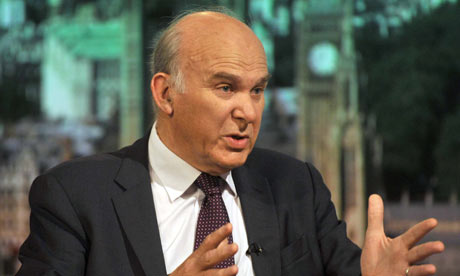Vince Cable: RBS to Remain in Public Hands 'For at Least Five Years'

The Royal Bank of Scotland is unlikely to be sold for at least five years, UK Business Secretary Vince Cable signalled on Sunday.
Prime Minister David Cameron has said he hoped to sell off the taxpayer's 81% stake in the bank "as soon as possible", while RBS chairman Sir Philip Hammond had said the sale process could start as early as next year.
But Cable said it was "pretty unrealistic" to expect the bailed-out bank to be sold off to the private sector before the current parliament ends in 2015.
Cable predicted the Government would retain its stake for most of the next parliament.
"I don't think it would be sensible for the Government to set a rigid timetable, but given where we start from I think it is pretty unrealistic to think of RBS going back into private ownership this Parliament or probably within five years," he told the Sunday Telegraph.
Cable's comment's shows the gap between the two coalition parties over the bank's future as they gear up for the general election.
The government spent £45bn keeping RBS afloat when the financial crisis hit in 2008, buying shares at 502p each. At close of trading on Friday, the price was 325.6p.
Cable's comments increase the likelihood that the bank will be broken up before it is re-privatised, said analysts.
Assets such as Ulster Bank and the RBS commercial property book, which is worth £63bn, could be sold off separately.
Investment bank Rothschild has been tasked with reviewing whether the 81% state-owned lender should be split into "good" and "bad" banks.
Cable added: "I think there is a very strong argument for saying that the bank got too big and indeed that was the source of its undoing.
"But we are having to balance the benefits of breaking up the bank (and) the potential benefits for competition (with) the significant costs, particularly in terms of disrupting IT systems.
"My colleagues in the Treasury are doing very detailed work on that cost-benefit calculation, because there is no simple yes or no answer."
Keeping its stake would enable the government to increase pressure on RBS to lend more.
The bank announced earlier this month that it had returned to profit, with a half-year pre-tax profit of £1.37bn, compared to a £1.68bn loss in the same period last year.
It has now seen its first two consecutive quarters of growth since the crash.
Earlier this month it was announced that Ross McEwan, head of RBS's retail arm, would replace Stephen Hester as RBS chief executive.
© Copyright IBTimes 2025. All rights reserved.



















